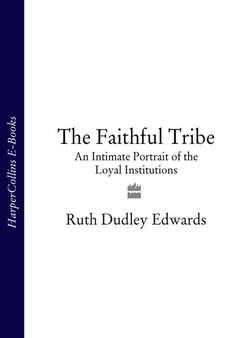Читать книгу The Faithful Tribe: An Intimate Portrait of the Loyal Institutions - Ruth Edwards Dudley - Страница 16
A Cancellation, 9 August 1997
ОглавлениеI was over from London for the Apprentice Boys’ parade which was to take place the next day, when just before midnight came the news that the Newtownbutler Residents’ Association was determined to block a small Black parade through the town early the following morning. So Mark and I decided to go there before we went to Derry.
The situation in Newtownbutler was particularly sad. Despite tragedies like Enniskillen and all the border murders, Fermanagh Protestants are notoriously less bigoted than those of any other Northern Ireland county. Newtownbutler had a cross-community historical society and a Thursday Club for the elderly and prided itself on its harmoniousness. As one resident put it in the summer of 1996: ‘When there was a death both communities attended the wake house and the funeral.’ And a local SDLP politician told a journalist that cooperation was the norm: ‘It’s the so-called sick-cow syndrome. It doesn’t matter if it is a Protestant or a Catholic cow. I remember once there was a cow in distress and the owner was away. A neighbour called to borrow something on the farm and saw the cow and called in others and by the time the calf was born, the DUP, the UUP, Sinn Féin and the SDLP had been there to help. That cooperation is there yet, but it is most definitely under threat.’
It was Drumcree Two and the subsequent boycotting of Protestant businesses that had made the difference. Within two months of Drumcree, Catholics and Protestants were boycotting alike and sectarian tensions had provided fertile ground for the establishment of a Newtownbutler Area Residents’ Association to try to block parades.
By August 1997 Newtownbutler was radicalized and no Catholic residents were prepared or able to challenge the Residents’ Association, which was able to swell its ranks when necessary by bringing in reinforcements from outside. What caused particular offence to Protestants were the protesters from the nearby town of Clones, in County Monaghan in the Irish Republic.
Mark and I arrived around 7 a.m. in Newtownbutler to find a group of disconsolate young men. Some of them had just arrived, a few were still arriving and others had been up all night fearful that the police would seal off the main street. Some of them seemed drunk. Not long before they had been told that the Blackmen had cancelled their parade. A smashed window was testimony to their frustration.
We walked up to the top of the village and then back to the bottom because I was shivering and Mark had a sweater in the car. A few RUC men arrived and took up their position at the top of the main street, well away from the protesters. They were in good humour because, as they confirmed, the parade had been cancelled. They would not have to face insults, stones, petrol bombs and maybe worse.
We wandered back to the protesters and found that some of them were still deeply reluctant to believe this had happened. It might be a cunning ploy. It might be that if the protesters left, the Blackmen would arrive and stage their parade after all. I couldn’t help. These were cross young men. It was not a gathering where one could explain that the Royal Black Institution didn’t approve of telling lies.
Protesters stood around grumbling for a while and then matters were enlivened by the arrival of a red-headed American woman in army boots who engaged the residents’ leader in conversation for the next fifteen minutes or so. Mark and I stood by fascinated, for here in the flesh was the living embodiment of the Noraid* stereotype – the American who was more republican than the republicans, whose crassness and bigotry made even Sinn Féin twitch.
She lived in Derry, it emerged, and had done so for two years. She had come to Newtownbutler with a carload of protest banners and was staying in a local guest-house. Amid great laughter at her own intrepidness, she explained how on the phone she had had to ask the guest-house owner if it was a nationalist household to be sure she’d be with ‘our people’. She talked a lot about ‘our people’. She spoke of Derry and of how Gerry O’Hara (Gearóid Ó hEárá) was ‘an angel’, who had obligingly arranged for her to be registered for voting purposes at his brother’s house.
She spoke with shining eyes of the protest movement. ‘Soon they won’t be able to march anywhere,’ she said triumphantly. ‘They should all be sent off to Scotland in a boat.’ (In this at least she showed herself slightly more moderate than one of the inhabitants of Derry who recently wrote on a wall across the road from the Apprentice Boys’ headquarters: ‘NO MORE LONDON/DERRY/START SWIMMING’.
Gerry McHugh, the local residents’ leader, was uneasy with her. He was well enough trained to know that you watch your words except in private; republicans never admit in public that they want to get rid of Protestants, and indeed many of them would never be anything like that extreme. As she ran out of steam, Mark asked her disingenuously if she’d now be going back to Derry for the Apprentice Boys’ parade. ‘Certainly not,’ she snapped. ‘I’m off to Donegal to speak Irish with my friends. Most of my friends speak Irish.’
Mark and I withdrew, leaving her to carry on encouraging Irish Catholics to hate and persecute Irish Protestants.
